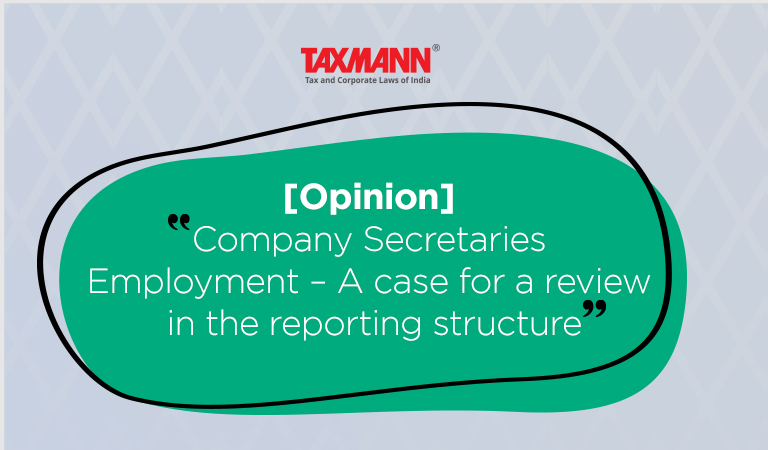[Opinion] Company Secretaries in Employment – A case for a review in the reporting structure
- News|Blog|Company Law|
- 3 Min Read
- By Taxmann
- |
- Last Updated on 27 December, 2022

[2022] 145 taxmann.com 561 (Article)
Background
Some decades ago, the general perception about a Company Secretary was that of a person who helped only in facilitating conduct of meetings of the board, committees and shareholders meetings, sending notices and agenda for these meetings and then finally preparing and circulating minutes of meetings to the board members. This apart, he was also expected to co-ordinate all the activities that went into the rigmarole associated with holding of meetings. The Company Secretary’s role was thus sadly limited to that of being a record keeper, administrator and compliance officer.
However, during the course of the last few years, there has been a paradigm shift in the perception of a Company Secretary. He has, in a manner of speaking, emerged from the shadows of perineal obscurity, the anonymity of being a “note taker” at board meetings or “administrative servant of the Board” to one who encompasses a much broader role of acting as a “Board advisor”, taking responsibility for the organization’s corporate governance and also acting as a “catalyst” in the Board’s decision-making process.
The Board, particularly the Chairman, has come to rely increasingly on the Company Secretary to advise the company not only on directors’ statutory duties under the Statutes , disclosure obligations and listing requirements but also in respect of corporate governance requirements and on best practices to be developed at the board as well as company level. The specialized role of the modern company secretary has catapulted him to the position of being one of the key governance professionals within the organization and has resulted in the Company Secretary being termed as a ‘Key Managerial Person’ (“KMP”) ranked in terms of the echelons of corporate hierarchy alongside the Chief Executive Officer and the Chief Financial Officer in the statute.
Although, the role of a Company Secretary has grown exponentially, it is observed ironically that many company secretaries in employment in India report to other KMPs such as the Chief Financial Officer or to the legal and compliance head. Thus, the question that merits articulation is whether despite the Company Secretary having such crucial responsibilities, is it advisable that in the best interest of the Company that he is made to report to another KMP without having to compromise on his independence and integrity?
Recognition for a Company Secretary
For the purposes of this discussion, it is appropriate to note briefly the recognitions which have been accorded to the Company Secretary from time to time under the Statute/Regulations. By no means is this intended to be a chronological recall of the accolades that hsve come to the Company Secretary.
- Companies Act, 2013:
Section 2 (51) of the Companies Act, 2013 recognizes a Company Secretary as a KMP standing shoulder to shoulder with the Chief Executive Officer, Managing Director, Manager, Whole-time Director and Chief Financial Officer. - Securities and Exchange Board of India (Listing Obligations and Disclosure Requirements) Regulations, 2015 (“SEBI Listing Regulations”)
– Mandates all listed companies to appoint a Company Secretary as its Compliance Officer.
– SEBI (Listing Obligations and Disclosure Requirements) (Amendment) Regulations, 2018, included Company Secretary as part of the senior management of a listed entity alongside Chief Executive Officer, Managing Director, Whole time Director, Manager and Chief Financial Officer.
– The Company Secretary shall act as a secretary to the Audit Committee.
This essentially shows that the due to the significant role played by a Company Secretary as a governance professional, provisions have been introduced in the various acts and regulations to take cognizance of the pivotal role played by the Company Secretary, equating his role to those played by the other senior most executives in the Company such as a Chief Executive Officer and Chief Financial Officer.
Click Here To Read The Full Article
Disclaimer: The content/information published on the website is only for general information of the user and shall not be construed as legal advice. While the Taxmann has exercised reasonable efforts to ensure the veracity of information/content published, Taxmann shall be under no liability in any manner whatsoever for incorrect information, if any.

Taxmann Publications has a dedicated in-house Research & Editorial Team. This team consists of a team of Chartered Accountants, Company Secretaries, and Lawyers. This team works under the guidance and supervision of editor-in-chief Mr Rakesh Bhargava.
The Research and Editorial Team is responsible for developing reliable and accurate content for the readers. The team follows the six-sigma approach to achieve the benchmark of zero error in its publications and research platforms. The team ensures that the following publication guidelines are thoroughly followed while developing the content:
- The statutory material is obtained only from the authorized and reliable sources
- All the latest developments in the judicial and legislative fields are covered
- Prepare the analytical write-ups on current, controversial, and important issues to help the readers to understand the concept and its implications
- Every content published by Taxmann is complete, accurate and lucid
- All evidence-based statements are supported with proper reference to Section, Circular No., Notification No. or citations
- The golden rules of grammar, style and consistency are thoroughly followed
- Font and size that’s easy to read and remain consistent across all imprint and digital publications are applied



 CA | CS | CMA
CA | CS | CMA
